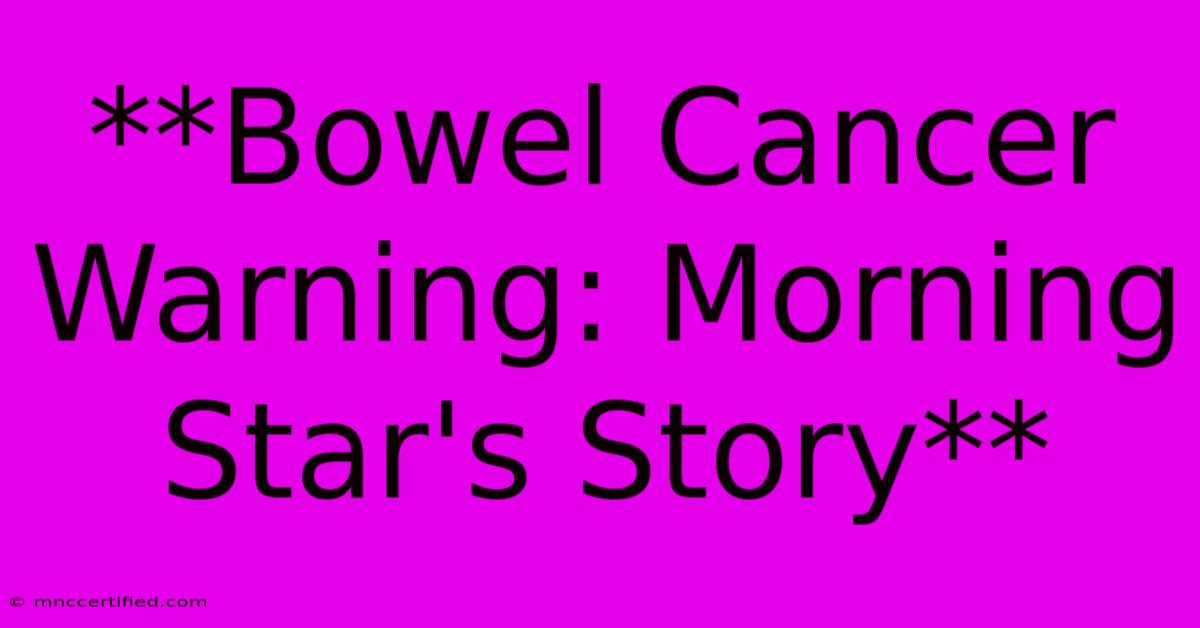**Bowel Cancer Warning: Morning Star's Story**

Table of Contents
Bowel Cancer Warning: Morning Star's Story
Bowel cancer, also known as colorectal cancer, is a serious health concern that affects millions worldwide. While many people are aware of the risks, understanding the signs and symptoms is crucial for early detection and treatment. This is a story that highlights the importance of recognizing bowel cancer warning signs.
Morning Star's Journey: A Wake-Up Call
Morning Star, a vibrant 50-year-old woman, was living a seemingly normal life. She enjoyed her daily routines, cherished time with her family, and was active in her community. However, a persistent change in her bowel habits caught her attention. She started experiencing frequent diarrhea, blood in her stool, and abdominal cramps. Initially, she dismissed these symptoms as a minor inconvenience. However, as the discomfort intensified and became more frequent, she finally decided to consult a doctor.
The Diagnosis: A Turning Point
After undergoing a series of tests, including a colonoscopy, Morning Star received a devastating diagnosis: stage II bowel cancer. The news was a shock, and it threw her life into turmoil. However, Morning Star knew that early detection was key to successful treatment.
The Importance of Early Detection
Morning Star's story serves as a stark reminder of the importance of early bowel cancer detection. Many people, like Morning Star, initially ignore subtle changes in their bowel habits. However, it's crucial to remember that these changes could be a warning sign of a serious health condition.
Bowel Cancer Warning Signs: Don't Ignore Them
The most common warning signs of bowel cancer include:
- Persistent change in bowel habits, such as diarrhea, constipation, or a change in the consistency of stools.
- Blood in the stool
- Abdominal pain or cramps
- Fatigue and unexplained weight loss
- Feeling full quickly after eating
If you experience any of these symptoms, don't delay in seeking medical advice. Early detection is vital for successful treatment.
Bowel Cancer Treatment: Options and Hope
Bowel cancer treatment options depend on the stage of the cancer. Common treatments include surgery, chemotherapy, radiation therapy, and targeted therapy. Thanks to advances in medical technology, the survival rate for bowel cancer has significantly improved in recent years.
Morning Star's Recovery: A Testament to Resilience
Following her diagnosis, Morning Star underwent surgery and chemotherapy. It was a challenging journey, but her strong will and the support of her loved ones helped her through it. Today, Morning Star is a survivor. She is a testament to the power of early detection and the resilience of the human spirit.
Prevention is Key: A Healthy Lifestyle
While there's no guaranteed way to prevent bowel cancer, adopting a healthy lifestyle can significantly reduce your risk. This includes:
- Maintaining a healthy weight
- Eating a diet rich in fruits, vegetables, and whole grains
- Limiting processed foods and red meat
- Regular exercise
- Avoiding smoking and excessive alcohol consumption
Conclusion: Take Control of Your Health
Morning Star's story is a powerful reminder that bowel cancer is a treatable disease, but early detection is crucial. Don't ignore the warning signs. If you notice any changes in your bowel habits, consult your doctor immediately. Early intervention can save lives. Take control of your health and prioritize regular screenings.
This article aims to inform and educate readers. It is not a substitute for professional medical advice.

Thank you for visiting our website wich cover about **Bowel Cancer Warning: Morning Star's Story**. We hope the information provided has been useful to you. Feel free to contact us if you have any questions or need further assistance. See you next time and dont miss to bookmark.
Featured Posts
-
Club Brugge 1 0 Aston Villa Ucl Run Ends
Nov 07, 2024
-
Trumps Shadow Bidens Terms Impact
Nov 07, 2024
-
Is Called Higher Studios A Good Investment
Nov 07, 2024
-
How Long To Keep Certificates Of Insurance
Nov 07, 2024
-
Livestream Red Star Belgrade Vs Opponent Champions League
Nov 07, 2024